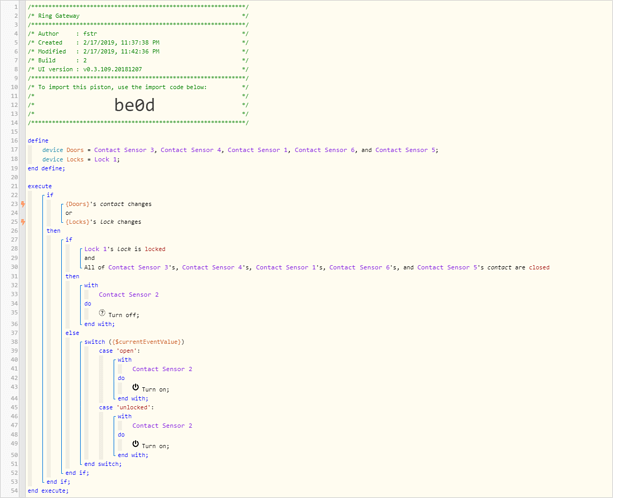1) Give a description of the problem
I am creating a gateway between Smartthings and Ring: I hardwired a Ring door sensor to a Mimolite switch.
Lets say I have 3 doors and 1 lock in Smartthings.
If ANY of the doors/locks are opened/unlocked then turn the Mimolite ON. This in turn will make the Ring door sensor think it is opened. This part is not the problem.
But ONLY if ALL the doors/locks are closed/locked then turn the Mimolite OFF. For example, lets say that 2 doors are open and one of them is closed, the Mimolite should not be turned off until all the doors are closed.This is the piece I cannot do.
2) What is the expected behavior?
Only once the last door is closed/locked should the Mimolite be turned off.
3) What is happening/not happening?
As soon as the first door closes, the Mimolite is turned off.
**4) Post a Green Snapshot of the piston
5) Attach any logs (From ST IDE and by turning logging level to Full)
|+2ms|╔Received event [Door/Window Sensor].contact = closed with a delay of 124ms|
| — | — |
|+10119ms|║RunTime Analysis CS > 18ms > PS > 10085ms > PE > 16ms > CE|
|+10121ms|║Piston waited at a semaphore for 10032ms|
|+10123ms|║Runtime (38824 bytes) successfully initialized in 10085ms (v0.3.105.20180628) (10120ms)|
|+10124ms|║╔Execution stage started|
|+10159ms|║║Comparison (enum) closed changes = false (1ms)|
|+10162ms|║║Cancelling condition #6’s schedules…|
|+10163ms|║║Condition #6 evaluated false (32ms)|
|+10174ms|║║Condition #11 evaluated false (8ms)|
|+10175ms|║║Cancelling condition #1’s schedules…|
|+10176ms|║║Condition group #1 evaluated false (state changed) (46ms)|
|+10179ms|║╚Execution stage complete. (55ms)|
|+10180ms|╚Event processed successfully (10180ms)|
|2/17/2019, 10:52:31 PM +612ms|
|+1ms|╔Received event [Door/Window Sensor].contact = closed with a delay of 110ms|
|+85ms|║RunTime Analysis CS > 18ms > PS > 50ms > PE > 17ms > CE|
|+87ms|║Runtime (38746 bytes) successfully initialized in 50ms (v0.3.105.20180628) (85ms)|
|+89ms|║╔Execution stage started|
|+120ms|║║Comparison (enum) closed changes = true (1ms)|
|+123ms|║║Cancelling condition #6’s schedules…|
|+125ms|║║Condition #6 evaluated true (29ms)|
|+126ms|║║Cancelling condition #1’s schedules…|
|+127ms|║║Condition group #1 evaluated true (state changed) (32ms)|
|+131ms|║║Evaluating switch with values [[i:2:null:0, v:[t:dynamic, v:closed, vt:string]]]|
|+136ms|║║Comparison (dynamic) closed is (string) open = false (2ms)|
|+140ms|║║Comparison (dynamic) closed is (string) closed = true (2ms)|
|+144ms|║║Cancelling statement #14’s schedules…|
|+492ms|║║Executed physical command [Ring Alarm Gateway].off() (344ms)|
|+493ms|║║Executed [Ring Alarm Gateway].off (346ms)|
|+497ms|║╚Execution stage complete. (409ms)|
|+499ms|╚Event processed successfully (499ms)|


